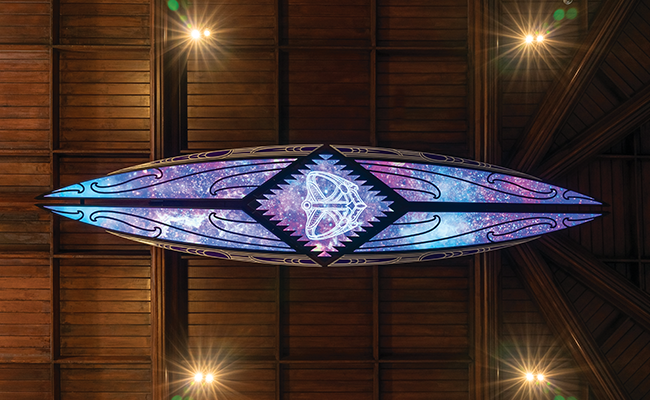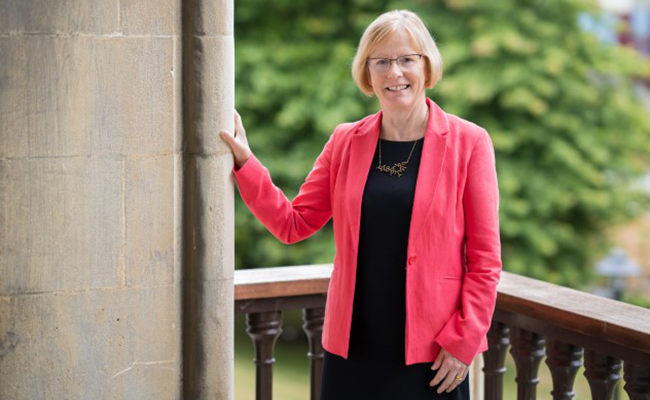
Vision 2040 will guide the University of Otago's path confidently into the future. Artwork in the University of Otago Clocktower foyer, title 'Matiti ki te ao, Uruao ki ruka' by Ephraim Russell, a sculptural work depicting the Southern Cross.
Over the next few weeks, the Bulletin is taking a deeper dive into Vision 2040, looking at how the new strategic direction will impact the University. We're asking our senior leaders what they hope the University of Otago will look like in 17 years time. Following on from last week, this week we hear from Deputy Vice-Chancellor (Academic) Professor Helen Nicholson and Deputy Vice-Chancellor (Research and Enterprise) Professor Richard Blaikie.
Deputy Vice-Chancellor (Academic) Professor Helen Nicholson

Professor Nicholson says making the University and teaching accessible and equitable for all learners, and constantly improving pastoral and academic care are key to ensuring its future success.
World-class teaching that serves this generation of students and the next is a cornerstone of Vision 2040, Deputy Vice-Chancellor (Academic) Professor Helen Nicholson says.
The newly approved strategy challenges our dedicated academic staff, supported by our professional staff, to lift their teaching even further.
“The strategy affirms our commitment to research informed teaching and transformative learning. We expect all our teaching to be informed by the latest research, bringing information into our lectures and classes from our own researchers and around the globe to ensure our students are learning at the forefront of their subject area.
“We also want to provide learning that is creative and innovative, that inspires our students to discover more. Part of the unique journey we provide at Otago as a residential campus university is the growth of young adults, and our teaching should be part of that. We want to serve our students by helping them understand themselves through our teaching, to interpret the society they live in and to develop autonomous thinking.”
Key to the University's aspirations are ways to incorporate te Ao Māori, to consider how to teach and for our students to learn and use tikanga and te Reo Māori.
“This will look different from discipline to discipline but incorporating Māori knowledge is a vital part of our research-informed teaching, as well as one of the ways to remove barriers for our Māori learners.
“We will work with our Māori treaty partners and our Māori staff and students to consider how to introduce this and build on what is happening in our secondary schools.”
Adapting to existing and future technologies to ensure our graduates are ready for the world they will work in, is also important.
“This will require all of us to keep abreast of what is happening in the digital technology space.”
Professor Nicholson notes that learning and teaching are foundations of the University from when it was first established, and, like those who came before us, the desire to create the leaders and workforce of tomorrow remains crucial.
Making our education institution and teaching accessible and equitable for all our learners, and constantly improving our pastoral and academic care are key to ensuring our future success, she says.
Vision 2040 provides a new challenge for the University - to continue the world-class teaching we are already delivering, but to also bed ourselves firmly in the place where we are.
“We are developing global citizens, but we also need to acknowledge the uniqueness of our location. Our undergraduate experience is different to others in New Zealand and our transformative student experiences are created from that. We want to extend that growth in our students by seeing ourselves as a University of the Pacific.”
That means embracing the cultural diversity of our Māori and Pacific partners, our international students, and our international staff, she says.
“It also means choosing to teach content that is distinctly ours, and where we are also contributing to, or leading, on the national and global stage.”
In 2040, Professor Nicholson hopes we will be a “vibrant university that is working closely with mana whenua; one that is graduating alumni who are equipped to become good citizens of a New Zealand which embraces its cultural identity, and who are contributing on the global stage”.
“I would also hope we continue to attract and retain a high calibre of academic staff and that we are recognised for our inclusive learning which is creating equitable outcomes for all students.”
Deputy Vice-Chancellor (Research and Enterprise) Professor Richard Blaikie

Growing a pipeline of talented research academics was another strand vital to achieving the vision, says Professor Blaikie.
The importance and quality of research at the University of Otago remains a core part of its future strategy, Deputy Vice-Chancellor (Research and Enterprise) Professor Richard Blaikie says.
“As a comprehensive university we remain committed to research across a wide range of discipline areas and supporting the academic freedom of staff to explore new ideas or challenge conventional wisdom in their research.”
But the new strategic direction, Vision 2040, does deliberately and strongly signal that the impact of our research, the application of knowledge for public good, and alignment of strategic research investment to priority areas will become a stronger focus.
“Under Vision 2040, research should matter beyond the context of its own self-contained area. In all research, whether contributing to a community or impacting on disciplinary knowledge, we should always care deeply about the beneficiaries of our research and consider ways to pass on our knowledge and findings to others.”
It will also be increasingly critical for our research to align with our strategy and with Te Tiriti.
“We are based in Aotearoa, in the Pacific – and that matters and should be reflected in our research choices.”
The ways in which Te Tiriti is represented and reflected in research is already well developed in some disciplines; lifting the bar on engagement more broadly is essential under Vision 2040 and creating policy and tools to support this mahi are all planned.
“We are in a strong position to start this work – we are already a research powerhouse, we have quality research being carried out across all disciplines, and we already advise Government in many important areas.”
In Vision 2040, research remains a strategic imperative, but it has been renamed Discovery and Innovation. Importantly, Professor Blaikie says this is a purposeful change that is not simply identifying the same action with different words.
“Research can be seen as a sterile, Western, analytical word, whereas discovery and innovation are words which invite more inclusive opportunities for fostering and generating new knowledge with wider audiences of participants.”
This re-focused strategic imperative will be supported by new or refreshed activities, including giving effect to the University's first Research Impact Framework released in 2022; using the University's Māori, Pacific and Sustainability strategic frameworks to guide decisions and investments would be crucial to achieving those goals and ambitions.
Growing a pipeline of talented research academics was another strand vital to achieving the vision, he noted.
“Creating and communicating impactful research which is based on our place in the world will reflect in our teaching and help forge a relationship with undergraduate and postgraduate students. We need to grow a research workforce which delivers research that enacts our vision.
“This place matters,” Professor Blaikie says.
“Our global inspirations are not diminished, but we are stronger and more relevant if we have a point of difference based on who and where we are. We can continue and even strengthen our contribution to global challenges if our work is bringing our unique view.”
